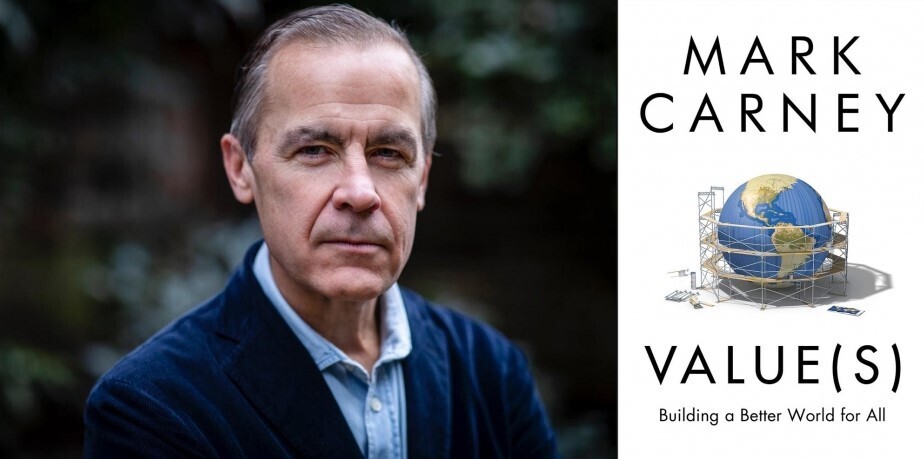Mark Carney, former Governor of the Bank of Canada and the Governor of the Bank of England, has written a weighty 600-page tome titled, Value(s): Building A Better World for All (Penguin, 2021). Why read a book written by an economist, and especially one focused on values rather than economic theory?
Carney is unique as a central banker: he has run central banks on two continents and he has experience working with leading financial services firms. Prior to his governorships, Carney worked at Goldman Sachs as well as the Canadian Department of Finance. Carney was later appointed as United Nations special envoy for climate action and finance as he prepared to step down as governor of the Bank of England in March 2020.
As of October 2020, Carney is vice chairman at Brookfield Asset Management where he leads the firm's environmental, social and governance (ESG) and impact fund investment strategy. In February 2021, Carney joined the board of fintech company Stripe which, as of March 2021, was valued at $95 billion.
Carney’s book seeks to explore these fundamental questions: “What is value? How is it grounded? Which values underpin value?” [2] Further, Carney addresses a core problem: “How by elevating belief in the market to an inviolable truth we moved from a market economy to a market society. And how we can turn this around.” [3]
Why did he write the book? “In many respects, this book is a belated response to a question posed a few summers ago when a range of policymakers, business people, academics, labour leaders and charity workers gathered at the Vatican to discuss the future of the market system.” [3] Pope Francis challenged them: “Your job is to turn the grappa back into wine, to turn the market back into humanity. This isn’t theology. This is reality. This is truth.” [3]
The book is a way to understand market dynamics and turn grappa back into wine. [4] Carney laments that “In short, we have moved from a market economy to a market society, and this is now undermining our basic social contract of relative equality of outcomes, equality of opportunity and fairness across generations.” [5]
How are values a way to create a fairer society? Carney explains that “Basing our response on objectives derived from these values [those he identified were solidarity, fairness, responsibly and compassion], and not on an economic determination of where the next benefit lies, will be the key to building back better.” He advises that “To rebuild an inclusive social contract, it is essential to recognize the importance of values and beliefs in economic life.” [8]
What is necessary for a successful economy? Carney lists the following characteristics: dynamism, resilience, sustainability, fairness, responsibility, solidarity, humility [8-9] Despite his protestations, the notion of humility might be a blind spot for him, which is likely as he is, after all, a banker who is presuming he has a prescription to build a better world. In the media, his hubris appears to only be a pinprick away. This hubris was on display recently when he snidely admonished a Member of Parliament who was asking too many pointed questions that he would help by explaining economics to him.
 Carney is a proponent of governmental intervention. He is an unabashed Liberal Party of Canada booster. He explains that “Markets on their own will never be adequately incentivized to build social capital, which requires a sense of purpose and common values among individuals, companies, investors and countries.” [9]
Carney is a proponent of governmental intervention. He is an unabashed Liberal Party of Canada booster. He explains that “Markets on their own will never be adequately incentivized to build social capital, which requires a sense of purpose and common values among individuals, companies, investors and countries.” [9]
After surveying his own varied background, Carney concludes that “My experience in the private and public sectors accords with Pope Francis parable. Value in the market is increasingly determining the value of society.” [12] He states that “The book will argue that, once we recognize these dynamics, we can turn grappa back into wine, and channel the value of the market back into the service of the values of humanity.” [12]
The book is clearly written from the macro standpoint, aimed at large companies and big institutions –the ecosystem in which Carney has existed. Carney’s insights don’t always seem relevant to the entrepreneurial class, despite the shout-out to 18th-century entrepreneur Josiah Wedgewood. Carney calls on companies, especially larger ones, to do more and to be more.
Companies should function as a mini-community that encompass many aims, rather than simply a profit-seeking entity. Carney states that “A company’s highest purposes is to provide solutions, in a profitable manner, and contribute in its own way to the betterment of society.” [402] Entrepreneurs and small business owners would beg to differ; they would like to be able to pay the bills and make some money.
Carney concludes his book with a thought on the meaning of life. He speaks of a life that can achieve lasting benefit. What is it? He suggests that is a “life of moral, not market, sentiments. A life that seeks to advance the trinity of distributive justice, equality of opportunity and fairness across generations.” [528] He adds that our moral sentiments “can live on as memes that multiply through values in the service of others. A worthy past sedimented into a better future. That is how grappa turns back into wine.” [528]
Parts of the book are worth reading, but it takes time to find them. Ultimately the book may have been better titled, “Reflections of a Central Banker” rather than building a better world for all. Carney provides a good summary of economic theories and a unique perspective on values. As a clarion call for building a better world, it rings hollow; as the reflections of an economist our expectations would have been muted and the contents of the book more palatable.

